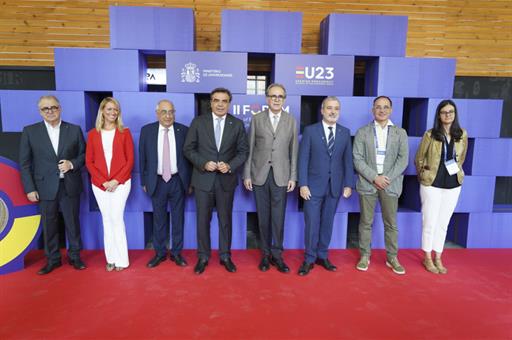400 higher education institutions meet in Barcelona at the 2nd Forum of European University Alliances
News - 2023.9.14
The Spanish Presidency of the Council of the European Union is holding the II Forum of European University Alliances on 14 and 15 September. The venue chosen to host the 2nd Forum is a unique and emblematic building in the city of Barcelona: the former Fabra i Coats textile factory.
Since its launch in 2017, the European Universities Initiative has driven the creation of 50 partnerships, encompassing more than 430 higher education institutions from 35 countries, and some 1700 partner institutions. The Initiative is now close to reaching its target of 60 partnerships involving 500 universities by mid-2024.
The purpose of establishing long-term strategic partnerships between European universities is to promote European identity and values, as well as excellence and transformation. Thus, since its inception, the Initiative has proposed partnerships that seek innovation and aspire to go beyond conventional boundaries.
Since their conception, the resulting alliances, heterogeneous in both structure and content, have shown the need for meetings between the alliances and with representatives of the European Commission, Member States, students and other stakeholders.
The first meeting of the alliances was organised during the French Presidency of the Union in June 2022. The aim of this 2nd Forum was to provide a space for dialogue and exchange of ideas to address the most important issues currently affecting European partnerships. Attended by almost 400 participants from various groups: the alliances themselves, representatives of the European Commission, Member States, student associations, national quality assurance agencies and university associations (e.g. CRUE, the French Rectors' Conference, EUA, Coimbra Group, etc.). All existing alliances, representatives of all Member States, Switzerland and the UK, 36 student associations and 20 quality agencies participated in the conference.
In order to put this forum together, there has been close collaboration with the alliances themselves and with the European Commission to determine the topics, moderators and speakers for each session. Furthermore, once concluded, participation mechanisms have been put in place to ensure that the discussions continue beyond the Spanish Presidency of the Council of the European Union.
The acting Minister for Universities, Joan Subirats, presented the event to the media, stressing that "we have prepared this 2nd Forum of Alliances with great affection and interest. University Alliances follows in the footsteps of one of the most efficient and successful proposals that the EU has had and that has contributed the most to the construction of Europe: the Erasmus programme. The Alliances aim to transform and strengthen the union of universities, the union of knowledge and talent and to project it to the world".
The Vice-President for the Promotion of the European Lifestyle of the European Commission, Margaritis Schinas, also attended the press conference to present the Forum where he insisted that the European University Alliances "are a process of transformation of our European Higher Education system where a common space for Higher Education in Europe can be built through them, based on the convergence of curricula, mobility, understanding and the European spirit".
Vice-President Shinas made special mention of the Erasmus programme: "it is the jewel in the crown of European integration. It is by far the most successful story in building this mentality of coexistence, of diversity, of understanding among young Europeans".
The Under-Secretary for Universities, Markus González, welcomed the event with these words: "I would like to highlight our satisfaction with the way this II European University Partnerships Forum has been received. I would like to highlight the great involvement of all the groups in planning the event as a place for meeting and dialogue.
During these two days of work it will be possible to discuss issues such as the "transformative potential and challenges for governments and national institutions" with the presence of Secretaries of States of Member States, where the commitment to improve the quality and competitiveness of European universities, the recognition of diversity, university autonomy and the need to develop non-predefined activities and cooperation formulas has been mentioned; how to bring the "European Universities" initiative closer to European society; the strategy for the creation of a joint European degree label to make it easier for higher education institutions involved in transnational cooperation to offer joint programmes and obtain joint degrees; or the social dimension of European universities and the need to create an inclusive environment in higher education, which fosters equality and diversity and responds to the needs of local communities.
Non official translation





